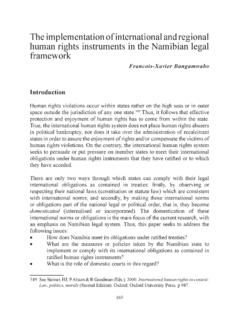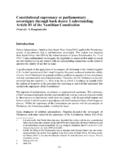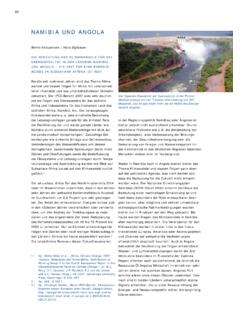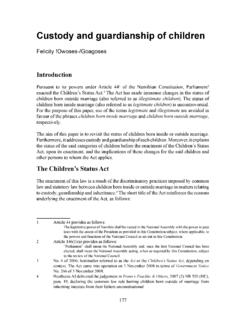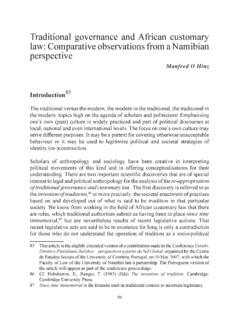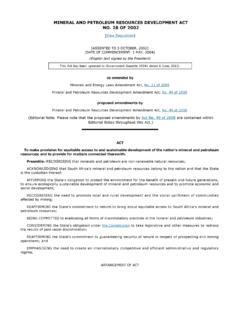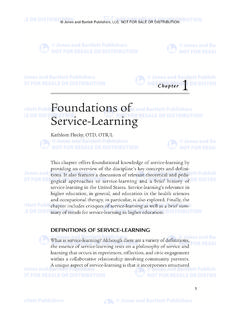Transcription of Women and custom in Namibia: A research overview
1 Women and custom in namibia : a research overview Lotta Ambunda and Stephanie de Klerk Customary law, culture and gender in namibia Customary law can be defined as the law according to which most of the Namibian population regulates marriage, divorce, inheritance and land tenure, amongst other things. Thus, customary law is a body of norms, customs and beliefs relevant for most Namibians. However, despite this relevance for the majority of the population, customary law has for a time been marginalised and even ignored owing to colonial rule. Customary law is a complex, dynamic system which has constantly evolved in response to a wide variety of internal needs and external Culture, as one underlying component of customary law, implies all issues of human thinking, feeling and behaviour in one or more social or national group. These issues involve religion, philosophy and attitude; social, administrative and legal institutions; clothes; nutrition; architecture; demography; behaviour; the arts; etc.
2 Thus, culture is composed of patterned and interrelated traditions which are transmitted over time by mechanisms based on the human capacity to create linguistic and non-linguistic Even though the word gender has sociological and cultural meaning, for the purposes of this paper, its legal meaning is of importance. According to Cotter,3. gender can be defined as follows: the social attributes and opportunities associated with being female and male and the relationships between Women and men, and girls and boys, as well as between Women and between men. These attributes, opportunities and relationships are socially constructed and are learned through socialization processes. They are context and time specific, but changeable, since gender determines what is expected, allowed and valued in a woman or a man in a given situation. In most societies, there are differences and inequalities between men and Women in the assignment of responsibilities, undertaking of activities, access to and control over resources, and decision-making opportunities 1 Hinz (2003).
3 2 Bennett (1996a). 3 Locke (1960:305 477, 364 365). 43. Women and custom in namibia : a research overview with gender as part of the broader socio-cultural context. Along with gender, there are other important criteria for analysis, including race, class, age and disability, and hence all these can, alone or combined, amount to a type of discrimination. Until namibia gained its independence, its society was deeply patriarchal and divided along racial lines. The patriarchal system is one based on that of paterfamilias, of the man being the head of the household. As such, his wife would be his property', and would be subordinate to him. However, since the advent of the Namibian Constitution in 1990, there has been a paradigm shift in human rights concepts. The Namibian Constitution provides a strong backdrop for gender equality in that it is one of the few constitutions in the world that uses gender-neutral language throughout, and it explicitly forbids discrimination on the basis of sex.
4 It provides for equality in all aspects of marriage, and gives special emphasis to Women in the provision which authorises affirmative Furthermore, the Constitution explicitly states that customary law survives only to the extent that it does not conflict with the Constitution, meaning that customary law may not, legally, entail any form of sexual It also puts men and Women in an identical position with respect to citizenship,6 including the acquisition of citizenship by marriage. Article 10, which is the most recognisable of the Constitution's provisions that unequivocally guarantees sexual equality, states the following: (1) All persons are equal before the law. (2) No person shall be discriminated against on the grounds of sex, race, colour, ethnic origin, religion, creed or social or economic status. All evidence alluding to the living reality of customary law shows that the law has developed ways and means of preserving its essence in spite of any impairment. In this regard, Article 66(1) of the Constitution reads as follows: Both the customary law and common law of namibia in force on the day of Independence shall remain valid to the extent to which such customary law or common law does not conflict with this Constitution or any other statutory law.
5 Therefore, Article 66(1) puts customary law on the same footing as any other law of the country as far as its constitutionality is concerned. This means that customary law has to comply with the constitutional provisions, particularly 4 Article 23(3), Namibian Constitution. 5 Article 66, Namibian Constitution. 6 Article 4, Namibian Constitution. 44. Women and custom in namibia : a research overview Chapter 3, which contains fundamental human rights and freedoms. Thus, the constitutional recognition of customary law protects it against arbitrary inroads, and places a legal duty upon national lawmakers to treat customary law like any other law as regards its repeal or amendment. Article 19 of the Constitution provides the rudiments of a new cultural approach to customary law: Every person shall be entitled to enjoy, practise, profess, maintain and promote any culture, language, tradition or religion subject to the terms of this Constitution and further subject to the condition that the rights protected by this Article do not impinge upon the rights of others or the national interest.
6 Article 19 entails the granting of a right to individuals and, hence, cultural groups to practise customary The Namibian government has been committed to the promotion of multilingualism and the maintenance of indigenous practices. A number of legislative enactments such as the Traditional Authorities Act8 have affected customary law. This piece of legislation provides for the establishment of traditional authorities within traditional communities, and defines the powers and duties of appointed traditional leaders. The Act also defines the scope of the mandate of traditional leaders and, thus, limits the autonomous, oppressive or tyrannical use of power by chiefs and headmen. In addition, the Act expressly sets out ways in which to settle disputes within the traditional community. Therefore, traditional leaders have to observe certain regulations before adjudicating on disputes. According to the Act, the Minister of Regional and Local Government, Housing and Rural Development has the responsibility of supervising traditional authorities.
7 In this way, too, traditional leaders can be held accountable for failing to observe constitutional provisions and statutory regulations. Other legislation relevant in terms of customary law is the communal land Reform Act,9 which makes it categorically clear that all communal land belongs to the state, but that the government has the responsibility of administering the land in the best interests of the traditional communities concerned. According to the Act, the communal land is held in trust by the government to promote the economic and social development of the people living in communal areas. The communal land Reform Act grants Women equal rights when they apply for communal land , and protects the surviving spouse of the deceased holder of a customary land right by giving the surviving spouse, who are Women in most cases, the right to apply to the chief or traditional authority to reallocate such 7 Bennett (1996a:29). 8 Act No. 25 of 2000. 9 Act No. 5 of 2002. 45. Women and custom in namibia : a research overview right in his/her name.
8 According to section 4(1)(d) of this Act, communal land Boards, who are responsible for the ratification of land rights, are obliged to include at least four Women . This means that Women are given an active role in the decision-making processes regarding land allocation in communal areas. The legal dynamics in a traditional community differ substantially from those in urban areas. Catering for this is the Community Courts Act,10 which provides for the establishment of community courts. These courts immediately lift the burden of costs for potential litigants in traditional communities. Aggrieved persons can now institute legal proceedings in their communities, under the laws that they trust, and can be awarded the remedies that they perceive as justified. According to section 13 of this Act, the law applicable in litigation is the customary law of the community concerned; but if the litigants are connected with different systems of customary laws, the court a quo is obliged to apply the customary law which it considers just and fair.
9 It is clear that community courts have an administrative role; thus, in line with Article 18 of the Constitution, they are obliged to act fairly and reasonably, and to comply with the requirements imposed on them by common law and any other relevant legislation. Therefore, any person that is aggrieved by the exercise of a community court's powers has the right to seek redress before a competent court. In such cases, in terms of section 26 of the Act, it would be a magistrate's court. There are legal mechanisms in place that work to ensure gender equality; hence, the absence of legal instruments is not the factor that impedes the attainment of gender equality. Rather, what slows its progress is the notion that much of Namibian society is fairly conservative, particularly where issues of morality, customs and family values are concerned. L Ambunda, one of the authors of this article, put it this way during the expert workshop on 23 September 2008: Culture may be seen as the way that we live, think, eat, and treat each other as well as the unique lifestyles that differ respectively from other ethnic groups.
10 Culture is in the clothes that we wear as well as things that we do and which does not necessarily have to be unique. We all share the same fundamental aspects of culture in the sense that most, if not all, ethnic groups in namibia have indigenous languages; we all have cultural rules and principles that we strictly follow; we have the same respect for our ancestors and we all have certain spiritual rituals that are practised as a means of communicating to the ancestor. Even though the sentimental aspects may differ, we all are culturally inter-related in one way or the other, and therefore no substantive difference ought to be made in respect of the different cultures. 10 Act No. 10 of 2003. 46. Women and custom in namibia : a research overview Being culturally oriented and having strong cultural values, I grew up in a rather culturally demanding household. Raised amongst ten siblings, life was easy back then. We grew up knowing that respect for the elders is the first thing on your mind every morning, that girls have to be fetching fire-wood, water, as well as wild fruits.

